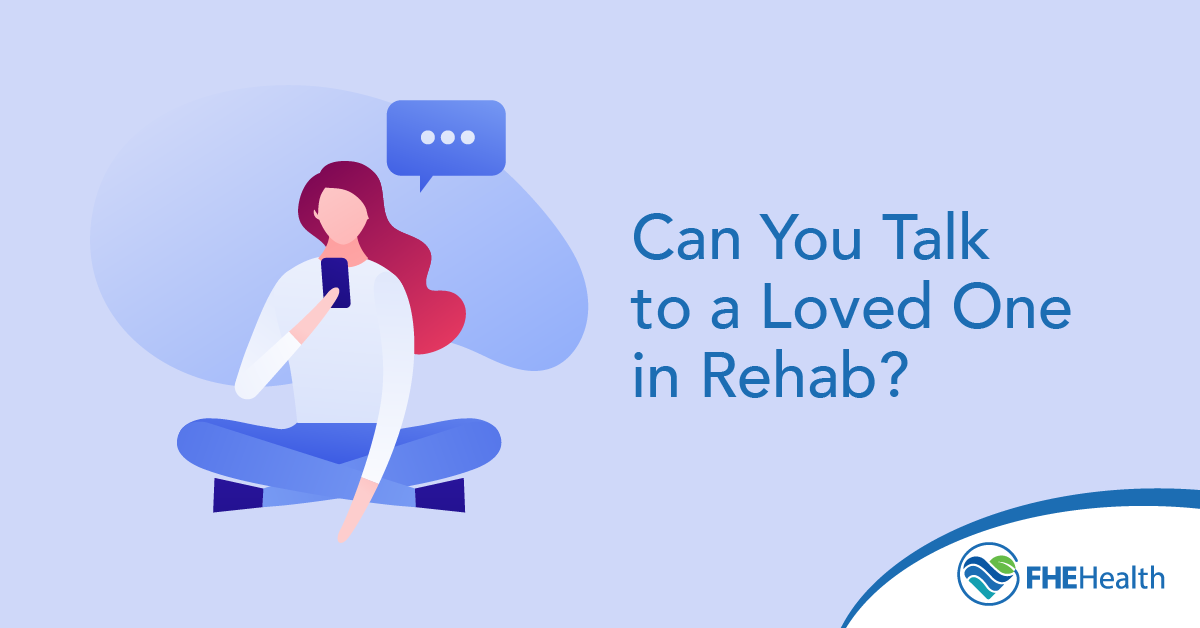
When you have a close friend or family member who struggles with addiction to drugs and alcohol, you might be at a loss for what to do once they enter rehab. Chances are good you’ve spent weeks, months or even years waiting for them to finally decide it’s time to deal with their substance abuse issues, and that can leave you with a host of conflicting emotions.
The amount of outside contact our patients here at FHE Health can have varies with each stage of rehab. Here’s what you need to know about how to find someone in rehab, what you can expect when contacting someone and the reasons behind potential restrictions on calls during our detox, residential treatment and outpatient partial hospitalization (PHP) and intensive outpatient programs (IOP) at FHE.
Contacting a Patient During Detox
Our medical detoxification program is a highly structured and closely supervised environment that gives patients the medical and psychological care they need to safely detox from alcohol, opioids, cocaine, heroin or any combination of prescription and street drugs.
While your loved one is in detox, they could experience a wide range of uncomfortable physical detox symptoms that could make them feel quite ill, but they’ll also be confronted with the flood of emotions that’s an inevitable part of getting sober.
During detox, it’s common for outside contact to be restricted to give the patient time to focus on themselves, their wellness and their goals once they enter the next stage of rehab. In some cases, patients may even be placed on a temporary “blackout” — a short period of time when they aren’t allowed to have any outside contact except in an emergency. This is something that would be discussed during intake and clearly communicated with the patient and their loved ones.
Family Contact During Residential Addiction Treatment
Once your friend or a family member has completed their detox protocol and moved into residential treatment, they’ll spend the next 21 to 90 days or more working hard to address the root causes of their addiction. Their days will be highly structured and filled with programs, classes and therapy sessions designed to help them learn the skills they need to understand their addiction, take responsibility for their own actions and start their recovery journey.
During the residential treatment component of the FHE program, we schedule set times daily for patient phone use so our patients can interact with friends and family members. It’s important to understand that at this point in the rehab process, your loved one will be focused on their own healing and recovery. They may come across as being disinterested in you and your family, or they may even choose to opt out of making phone calls for a while.
We also offer family workshop classes during treatment where patients and their loved ones can meet with a therapist to deal with conflicts, address concerns and learn how to resolve issues related to the addiction.
Contacting Friends and Family During Outpatient Treatment
Following completion of our inpatient treatment program, patients transfer to our outpatient addiction care program, which includes our partial hospitalization program and our intensive outpatient program.
At this stage of rehab, your loved one will have access to their own personal phone, and they’ll be free to make and accept calls whenever they aren’t participating in a class or session. Keep in mind that our outpatient patients continue to maintain a full, structured schedule, so the amount of time available for outside contact may be somewhat limited.
Respecting Boundaries During Rehab
One of the most common questions friends and family members ask about our patients here at FHE Health is whether they should reach out to their loved ones in rehab or simply wait for the patient to contact them.
Unfortunately, there’s no simple answer to this question.
Addiction is a complex disease that affects everyone close to the addict, and it often involves conflict, unhealthy communication patterns and negative behaviors. While your loved one is in treatment, they’ll be expected to identify the complex factors that led to their substance abuse, and they’ll be learning new ways to manage their emotions and interpersonal relationships.
Generally, social support is important for recovery. In fact, studies show that having a strong support network leads to improved outcomes from treatment for addiction. For some people, continuing to maintain their connections with loved ones while in rehab is highly beneficial.
However, other people undergoing treatment may feel differently. For them, working on their issues during treatment means they need space and time away from their outside lives. As a result, they may prefer to go no-contact during rehab.
If your loved one makes this decision, know that their desire for distance doesn’t mean they’re pushing you away, rejecting your support or even blaming you for their problems. It simply means they’re making the most of their time in treatment by focusing on themselves, their issues and what they can do to be successful once they leave rehab.
FAQs About Contact During Rehab
Learn more about maintaining contact with your loved ones in rehab by reviewing the answers to these common questions.
Need More Info About Contacting Your Loved One in Rehab? Call Us
At FHE Health, we know substance abuse and addiction impact the entire family. We’re committed to providing support to everyone through our cutting-edge, research-based addiction and mental health recovery programs. If you’re looking for information about how you can help your loved one while they’re in treatment for addiction issues, call us here at FHE Health.






